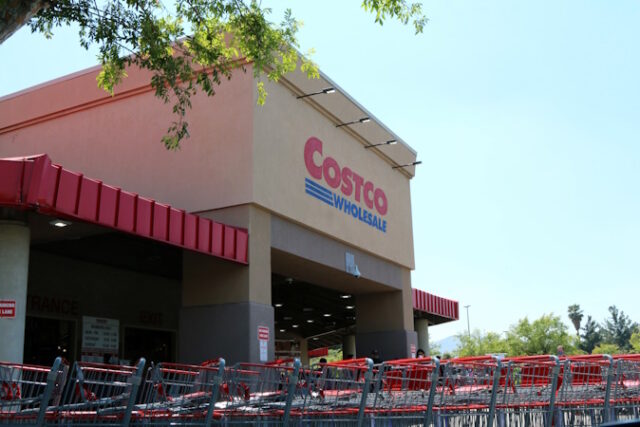
The Costco shopping experience is now a global phenomenon, with consumers now able to enjoy the wholesale chain’s bulk-shopping discounts and $1.50 hot dogs across the U.S. and in places like Taiwan, Japan and Australia.
The company continues to shake up that experience, too. Not only does it manufacture many of its own goods under the Kirkland Signature brand, but it recently began selling gold bars. And as the price of the precious metal hit a new all-time high again this month, the new product offering has been well received by members.
Costco’s foray into precious metals has generated eye-popping results. The company is allegedly pulling in six figures in sales each month since its decision to begin selling gold, demonstrating that members have taken to buying gold bars alongside rotisserie chickens and bulk toilet paper. But is this the best way to invest in the yellow metal?
During summer 2023, Costco made the move to start selling one ounce gold bars at its wholesale locations. Within eight months, experts suggest the stores have drawn impressive amounts of interest from this new venture.
In a note to clients, Wells Fargo analysts said they expect revenue from gold sales to fall between $100 million and $200 million monthly. The Swiss-made gold bars have repeatedly been selling out since they were first offered. However, this doesn’t mean the venture is profitable for Costco. The store receives a low premium on gold purchases, and it offers cash back to certain buyers who use credit cards, meaning gold sales are not contributing to any significant uptick in profits.
As for investors, right now is a good time to own gold. The price of the precious metal reached an all-time high of $2,390 per ounce on April 12. In fact, gold has outperformed the S&P 500 so far in 2024.
The principal drivers for gold’s current bull run are twofold. First, the surge in gold prices can be partially attributed to the Federal Reserve’s interest rate policy. Gold historically has an inverse relationship with interest rates, and with the Fed expected to cut rates this year, investors are beginning to look into other assets as APYs are already falling on instruments like high-yield savings accounts.
The second factor propelling gold prices is a combination of weak consumer confidence and lingering inflation. With inflation coming in hotter than expected in March, purchasing power continues to be eroded, which drives investors to seek out safe-haven assets, of which gold is the frontrunner as a liquid store-of-value.
Is buying gold from Costco a good idea?
Consumers can now hop in their cars and drive to the nearest Costco location to purchase gold. But is it a good idea? It’s a convenient option for those interested in investing in gold long term. But if investors choose to buy the precious metal at the discount warehouse, there are pros and cons they should be aware of. Some incentives Costco offers may up the ante, but you’d be lacking the peace of mind afforded by buying gold in a brokerage account and holding it in a portfolio.
First, Costco gold buyers will have to pay a mark-up on their bars. Known as the spread, the stores charge 2% above the current market rate. This isn’t abnormal, though. Online gold dealers also charge a spread for their non-wholesale transactions. Costco’s premium falls within the industry range making it no worse a deal.
With the bonuses Costco offers on precious metal purchases, in fact, some buyers may effectively eliminate the premium. Those who buy their bars at the store using Citigroup credit cards are eligible for 2% cash back on their purchase. Executive members at Costco can receive an additional 2% cash back.
On the other hand, Costco does not afford its members any opportunities to purchase gold in bulk. When it has the metal in stock, buyers are limited to five bars per transaction. So, if investors are looking to stockpile any significant quantity of the metal, they’ll need to go through a precious metals dealer.
Buying gold at Costco also means experiencing the same pitfalls as those who purchase the physical metal from online dealers. These drawbacks are avoided for investors who purchase gold on paper, though. Once gold is purchased at Costco, the consumer is then responsible for its safekeeping. It’s a scenario not unlike stuffing cash in a mattress, and it carries risk. To avoid that, the gold can be insured and stored in a vault, but these are additional expenses.
Conversely, paper gold investments — like owning shares of a gold ETF, which can be anchored by physical gold held in insured vaults — provide investors with that same peace of mind without having to pay extra for it. These investments are also more liquid than physical gold, meaning they’re easier to buy and sell since they’re listed on exchanges. Some gold ETFs even pay dividends, meaning they can play a role in a strategy aimed at generating passive income while also benefiting from the price strength of the underlying commodity.
All said, buying gold from Costco isn’t any worse than buying it from a dealer if you don’t mind the purchase limit. It could be better than buying from a gold dealer in some instances, since you don’t need to worry about potential scams and salesmanship, and you can earn as much as 4% cash back. But, there are still options to invest in gold that offer greater safety, higher liquidity and less hassle than holding onto the bars yourself.
Editorial Disclaimer: All investors are advised to conduct their own independent research into investment strategies before making an investment decision. In addition, investors are advised that past investment product performance is no guarantee of future price appreciation.
This article originally appeared here and was republished with permission.












